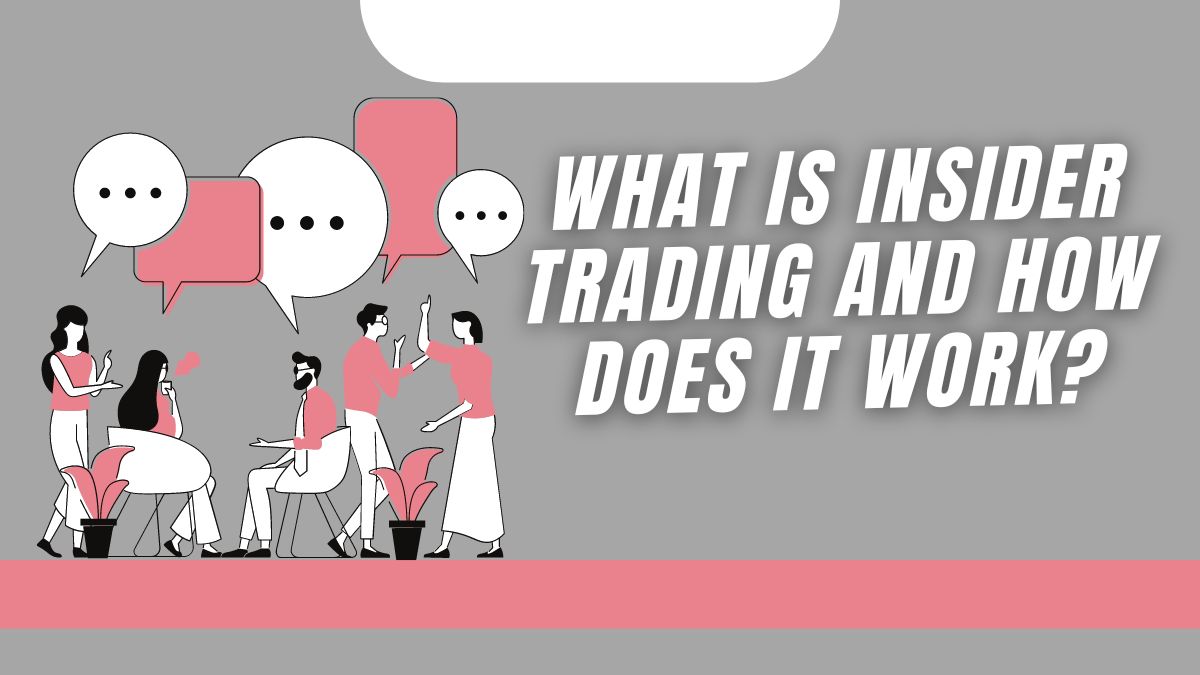What is Insider Trading and How Does It Work? Understanding the Basics

Have you ever wondered how some people seem to have insider knowledge on stock market trends, making big profits while others struggle to understand the intricacies of trading? Well, the secret might lie in a controversial practice known as insider trading. While the term itself might spark curiosity or even raise eyebrows, understanding its basics is crucial in navigating the world of finance.
In this blog post, we will delve deep into what exactly insider trading is and how it works, demystifying its nuances and uncovering its implications for traders and investors alike. So grab your coffee and get ready to unlock the mysteries behind this intriguing yet contentious concept!
Table of Contents
What is Insider Trading?

Insider trading refers to the trade of stocks or other securities by individuals who have access to nonpublic information about the company. This information can come from inside sources such as employees, officers, directors, or consultants.
For insider trading to occur, three things must happen:
- The individual must know about the company’s upcoming announcement that is not publicly available.
- The individual must trade in the securities before this announcement is made public.
- The trades must be made with the intent to profit from the information gained.
Insider trading can have serious consequences for the investors who engage in it. For example, it can result in a loss of investment capital, lead to market manipulation, or expose the company to potential lawsuits.
Several laws prohibit insider trading. The most common is the federal securities laws, which are enforced by the SEC (Securities and Exchange Commission). Other laws that deal with trading include the Securities Act of 1933 and the Securities Exchange Act of 1934.
How Does Insider Trading Work?
When a person has access to Material Nonpublic Information (MNPI), they are considered an insider. This means that the person has information that is not generally available to the public and, as a result, may be able to trade securities in anticipation of or based on this information.
When a company’s management has access to MNPI, it is considered Disclosure Trading. The goal of Disclosure Trading is to ensure that management has accurate and up-to-date information about the company’s business so that they can make sound decisions about their company’s future.
However, if management does not have access to MNPI and instead relies solely on publicly available information, this is considered Outside Trading.

There are two general types of trading: Insider Trading and Disclosure Trading.
Insider Trading, on material nonpublic information (MNPI) to profit from the difference between the price at which they buy a security and sell it, is illegal. In Disclosure Trading, where management has access to MNPI but chose not to disclose it for fear of impacting stock prices, disclosing such material info would still be against the law as long as management did not trade on this inside information to make profits themselves.
Insider trading usually occurs when someone with knowledge of material nonpublic information sells shares before the information becomes publicly available or buys shares after the price has already increased as a result of knowing such material nonpublic information. When allowed to proceed undetected, insider trading can lead to unfair and excessive profits for the traders involved.
There are two main ways in which insider trading can be Detected:
- By monitoring stock prices and analyzing transactions to identify unusual activity that may be indicative of insider trading.
- By investigating the source of the information to try and identify who inside the company had access to MNPI and when they received it.
Factors That Influence Insider Trading

insider trading is the practice of trading stocks or other securities based on information that a person knows before it is publicly available. The U.S. Securities and Exchange Commission (SEC) defines insider trading as completing any trade involving shares of the issuer that the individual knows or has reason to know is in violation of Rule 10b5-1, which prohibits insiders from buying or selling securities with knowledge of material information that could affect the price of those securities.
Several factors can influence whether someone will engage in insider trading. These include:
- Divulging confidential information before it becomes publicly available can give an investor an advantage over others who do not have access to this information. This type of trading is considered insider trading because the individual has obtained confidential information before it has been made public and used this knowledge to financially benefit themselves by making a trade before the widespread distribution of this information.
- Confidentiality agreements between companies and their executives can also lead to insider trading violations. For example, if a company’s CEO knows about upcoming product announcements but does not want these announcements released to the public, he or she may sell stock in advance of these announcements in violation of Rule 10b5-1. In some cases, executive non-disclosure agreements may preclude employees from disclosing any inside information at all, regardless of when they became aware of it.
- People who are highly knowledgeable about a company’s finances and operations are more likely to engage in insider trading because they can exploit information that is not generally available to the public. For example, a financial analyst who has access to confidential financial data about a company may trade stocks based on this information even if it is not yet publicly available.
- People who are close to someone who has inside knowledge of a company’s finances or operations may be more likely to engage in insider trading because they have an opportunity to profit from information that is not generally available. For example, a friend or family member of the CEO who has access to confidential information about the company’s finances may sell stock in advance of an announcement that could negatively impact the stock price.
Examples of Insider Trading

Insider trading is the trading of stocks or other securities by someone who has access to nonpublic information about the company. This information can come from sources such as inside sources (discussed below), analysts, or others with access to company data. Insider trading can create a conflict of interest and may be illegal if it occurs with the intent to influence the prices of a security.
There are various types of insider trading: purchase/sale, tipping, and conversion.
- Purchase/sale: When an insider purchases a security, this represents a new investment in the company. Similarly, when an insider sells a security, this indicates they see no future benefit in holding onto that security and are cashing out.
- Tipping: Tipping involves giving insiders knowledge about upcoming company actions to generate favorable stock price movements. For example, a trader might provide inside information on planned product launches for an insider at a rival company to sell high and generate profits for themselves. This type of insider trading is often illegal because it provides traders with unfair advantages over others who do not have this information.
- Conversion: Conversion occurs when an insider changes their mind about what security to buy or sell and decides instead to sell the underlying shares they already own into the market. This can happen when insiders hear rumors that their shares are being traded at an unusually high price and decide to cash out before things deteriorate further. Conversion also occurs when company executives sell their shares ahead of bad news or
Conclusion
Insider trading is a criminal activity that can carry serious penalties, including prison time and fines. Learning the basics of insider trading will help you understand how it works and protect you from becoming a victim. Insider trading is when someone trades on information they know about a company before it is made public, which can result in substantial profits.






